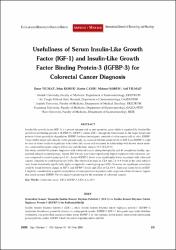Usefullness of serum insulin-like growth factor (IGF-1) and insulin-like growth factor binding protein-3 (IGFBP-3) for colorectal cancer diagnosis
Künye
Yılmaz, Ö., Koruk, İ., Çayır, K., Koruk, M. & Yılmaz, A. (2009). Usefullness of serum insulin-like growth factor (IGF-1) and insulin-like growth factor binding protein-3 (IGFBP-3) for colorectal cancer diagnosis. Uluslararası Hematoloji-Onkoloji Dergisi, 19(1), 23-27.Özet
İnsülin benzeri büyüme faktörü-1 (IGF-1), etkisi insülin benzeri büyüme faktör bağlayıcı protein-3 (IGFBP-3) tarafından düzenlenen, potent bir mitojen ve antiapoptotik ajandır. IGFBP-3, IGF-1’i dolaşımda taşır, hedef dokulara yönlendirir, onu proteolitik degradasyondan korur. IGFBP-3 in vitro şartlarda kolon kanser hücrelerinin tümörojenik potansiyellerini azaltır. IGFBP-3 hedef hücreleri doğrudan inhibe edebilir. Çalışmamızda kolorektal kanserli hastalarda IGF-I, IGFBP-3’ün tümör markırı olarak kullanılıp, kullanılamayacağı ve bilinen tümör markırlarından karsinoembriyonik antijen (CEA), karbonhidrat antijeni 19-9 (CA19-9) ile olan ilişkisi incelendi. Çalışmamıza histopatolojik olarak kolorektal kanser teşhisi konulmuş 40 hasta ile, kontrol grubu olarak benzer yaş grubundan ve tamamen sağlıklı 40 kişi dahil edildi. Kontrol grubu ile kıyaslandığında kolorektal kanserli hastalarda IGF-I düzeyi anlamlı derecede yüksek bulundu (p< 0.01). IGFBP-3 düzeyleri kolorektal kanserde kontrol grubu ile kıyaslandığında anlamlı derecede düşük bulundu (p< 0.05). Yine aynı vakalarda çalışılan CEA ve CA19-9 düzeylerinde gözlenen artış kontrol grubu ile kıyaslandığında istatistiki açıdan anlamlı olarak yüksek bulundu (p< 0.05). Fakat IGF-1 ve IGFBP-3 düzeylerindeki değişimi ile CEA ve CA 19-9 arasında anlamlı ilişki tespit edilemedi. Sonuç olarak, IGF-I düzeyindeki artış, kolorektal kanser şüphesi olan hastalarda tümör varlığı yönünden anlamlı bir gösterge olarak kabul edilebilir. IGFBP-3 düzeyini artışına neden olabilecek ajanlar kolorektal kanser tedavisinde yeni ufuklar açabilir. Insulin-like growth factor (IGF-1) is a potent mitogen and an anti-apoptotic agent which is regulated by insulin-like growth factor binding protein-3 (IGFBP-3). IGFBP-3 carries IGF-1 through the bloodstream to the target tissues and protects it from proteolytic degradation. IGFBP-3 reduces tumorigenic potential of colon cancer cells in vitro. IGFBP- 3 may inhibit target cells directly. In the present study, we assessed whether serum levels of IGF-I and IGFBP-3 could be used as tumor markers in patients with colorectal cancers and evaluated its relationship with known tumor markers, carcinoembryogenic antigen (CEA) and carbohydrate antigen 19-9 (CA19-9). Our study enrolled 40 patients diagnosed with colorectal cancer histopathologically and 40 completely healthy, agematched subjects (control group). Serum IGF-I levels were found significantly higher in patients with colorectal cancers compared to control group (p< 0.01). Serum IGFBP-3 levels were significantly lower in patients with colorectal cancers compared to control group (p< 0.05). The observed increase in CEA and CA19-9 levels in the same subjects were found statistically significantly higher compared to control group (p< 0.05). However, no significant association could be found between change in IGF-1 and IGFBP-3 levels and CEA or CA 19-9. Increased serum levels of IGFI might be considered as a significant predictor of tumor presence in patients with suspected colorectal cancer. Agents that could increase IGFBP-3 levels might be promising for the treatment of colorectal cancers.


















